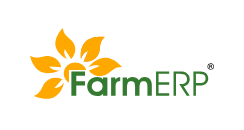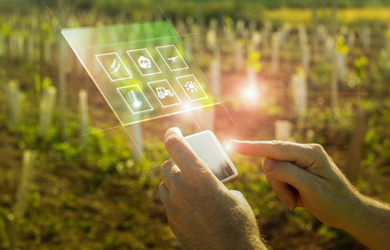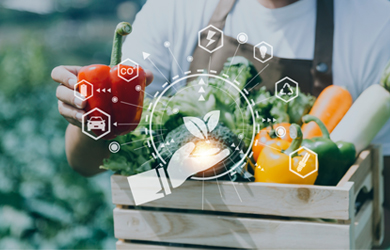Using Information and Technology in Hydroponics Farming – 5 Take-aways
FarmERP has been actively working towards boosting the agri-tech industry through its farm management software for over two decades now, and the trends show the positive growth prospects of hydroponics farming. The world is rapidly moving towards more sustainable modes of agriculture with the help of technology, and hydroponics or vertical farming is emerging as a more profitable and sustainable method of farming. With the rise of farm management systems integrated with business analytics and information technology, hydroponics and vertical farming industry is expected to make a move towards tech-driven agriculture tools to boost their business in the new market scenarios. This article discusses the 5 takeaways for stakeholders in the hydroponics industry that indicate the increasing implementation of technology in this space.
With the increasing population of the world, the demand for food is likely to jump rapidly. However, the agriculture industry was running behind on the demand-supply range, mainly attributing to its dependence on weather and changing climatic conditions. In recent years, many farming companies have invested heavily in exploring more economic, sustainable, and profitable ways of boosting agricultural produce that can bring a balance to the demand and supply of food to the world. This reflects in the rising adoption of technologically advanced farm management systems in the agriculture industry .
Consequently, the popularity of hydroponics farming, coupled with features of farm management platforms, has increased tremendously, as this method enables businesses to improve their productivity and profitability irrespective of weather and climatic conditions. With the high capital flow towards the vertical farming industry and technology, leading stakeholders are expected to invest heavily in farm management systems with various modules that suit specific requirements of hydroponics or vertical farming. In the coming years, this is expected to drive a sea change in the growth prospects of the vertical farming or hydroponics industry in the coming years.
AgriTech will Fix What’s Broken in the Agriculture Industry
The agriculture industry was always known for the potential for losses it exhibited due to its heavy dependence on unpredictable weather and natural resources. Furthermore, unavailability of suitable technology that could enable stakeholders to understand their business analytics also hindered the growth of the industry. As the percentage of farm-dependent economies continues to remain high across the world coupled with burgeoning demand for food, technology has come to rescue for the farming industry to prosper amidst the aggravating problems of climate change and limited natural resources.
The changing technology paradigm in the agriculture industry has uncovered the potential of making attractive profits in the hydroponics industry. Stakeholders in the agriculture industry are now increasing their investments in the advanced hydroponics farming technology to offer safer, sustainable, and healthier produce to their customers throughout the year. Leading stakeholders in the agriculture industry have already increased their focus on integrating next-generation technologies with the tools they are using in hydroponics farming. However, it will be highly instrumental for them to understand the recent business trends in the hydroponics or vertical farming industry to consolidate their position in this landscape, in the coming future.
#1. Hydroponics or Vertical Farming + Technology = More Sustainable Business
With the increasing awareness about climate change and harsh impact of industrial activities on the environment, consumers are becoming more sensitive to the carbon footprint of businesses they choose to interact with. This has had a major impact on how the agriculture industry operates around the world.
Along with the rising environmental concerns of consumers, stakeholders are also noticing potential risks of heavy dependence on weather and traditional resources and methods of farming. This is triggering a lot of farming companies, not only to take up vertical farming over traditional agricultural techniques, but also to adopt high-tech agriculture management software to fortify their business in the industry.
#2. High-tech ERP Systems Enable Cost Control in Vertical Farming Businesses
While vertical farming gained immense popularity in the agriculture industry, mainly due to its benefits vis-a-vis sustainability, many companies considered hydroponics as pie-in-the-sky ventures. On the contrary, powering LED grow light is the biggest cost-triggering element of vertical farming, as compared to traditional, fresh fruit & vegetable farming methods.
Businesses need to understand the potential of advanced ERP software for farm management in keeping the business costs under control, as it enables complete monitoring and tracking of various resources. FarmERP is one of such farm management systems that have not only been helping agribusinesses improve their productivity for over 20 years, but also offering them useful business insights to boost their profitability.
#3. Use Technology to Control, Monitor, and Grow Multiple Vertical Farms Remotely
A mounting number farming companies are investing in hydroponics and vertical farms across the world, which indicates a trend triggered by increasing demand for food. Especially in regions with the problems of water scarcity, many businesses have commenced new business locations in different countries. Such as farming companies need to unlock the power of technology to ensure high profitability in each of their vertical farms without having to be present at the location, and this can be achieved with the use of high-tech farm management systems.
#4. Leverage the Power of Artificial Intelligence and Machine Learning to Practice Efficient Farming
Artificial Intelligence and Machine Learning are currently the most advanced and popular technologies, used in virtually every single industrial area, today. Businesses in the agriculture industry are also making a move towards unleashing the power of these technologies in making their farms more resilient and strengthening their position in the agriculture industry.
Hydroponics and vertical farming industries are no exception. A mounting number of hydroponics farming companies have put their trust in robust farm management systems that not only forecast their business needs accurately, but also provide them with algorithms that predict various aspects of farming such as early-stage diseases and changes in water need of the crops.
#5. Amidst the Increasing Growth of Hydroponics, the Future Looks Hybrid
It is no brainer that hydroponics and vertical farming industry is booming across the world, especially in regions with water scarcity like the Middle East. However, the high operating costs and high capital required for running a vertical farming business is likely to emerge as a prime factor to hinder its growth in the future. Thereby, a mounting number of businesses are resorting to farm management systems that can guide them on how to reduce their operational costs and boosting their business profitability.
In addition, the leading businesses are also increasing the use of unconventional energy sources, such as solar energy, to mitigate the total business cost in the long term. In the future, many businesses are likely to rely on both traditional and hydroponics farming methods to boost their profitability and productivity, by producing commercial crops such as fruits & vegetables, through traditional methods and producing countercyclical crops through vertical farming to meet the local demands.





